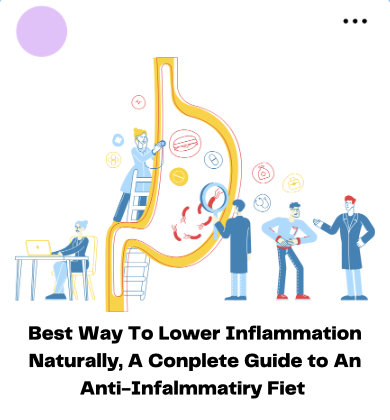
Best Way To Lower Inflammation Naturally,
A Complete Guide To An Anti-Inflammatory Diet
Inflammation is a physiological process that occurs naturally in our body, it allows for remodeling and healing to occur. Inflammation in the acute stages of injury is a good thing to have. Without inflammation, our bodies wouldn’t heal and cell proliferation and remodeling wouldn’t occur.
In the sports medicine world, this theory is seen in the recommendation of most conditions. After an acute injury, it was believed that rest, ice, and compression were the correct treatment methods, the main goal being to lower inflammation. The current belief is that this method actually delays the health process and prolongs recovery. This is due to the fact that we are actually delaying the body's normal response to an increase in inflammation.
The problem and concern with inflammation are in cases where individuals experience chronic systemic inflammation. It has been shown that chronic inflammation can lead to numerous diseases, including arthritis, asthma, atherosclerosis, autoimmune diseases, diabetes, and cancer.
We are going to break down the steps you can take to quickly lower the overall inflammation in your body to better help fight chronic disease and boost your sports performance/ recovery.
Anti-Inflammatory Diet
The easiest and fastest way to reduce inflammation is by changing what we eat. The types of food we consume have a dramatic impact on our inflammatory pathways influencing how we sleep, think, and feel.
Looking at where to start can be confusing, people often question “What is the best diet to reduce inflammation”, “ What are anti-inflammatory foods”, and “What is the fastest way to reduce inflammation.”
Due to its effectiveness, simplicity, and evidence back research the Paleo-Diet is at the top of the list when looking to lower chronic inflammation.
What is a Paleo Diet
The Paleo diet is also known as the Paleolithic diet or the hunter-gather diet. The main idea behind the paleo diet is that our bodies aren’t meant to handle the processed foods found so commonly today. The paleo diet focuses on eating real whole foods that could have been consumed by our early ancestors.
Our bodies were never designed to eat ultra-processed foods that are being advertised today for their flavor, convenience, and accessibility. Common farming practices try to produce high yields at low cost resulting in lower quality and less nutritious choices. Grains, dairy, and legumes are so common because they are easy to produce and cost-effective.
Basics of a Paleo Diet·
- Lean meats
- Fish
- Vegetables
- Fruits
- Nuts and seeds
- No Gluten
- No Dairy
Why Should We Be Avoiding Certain Foods
You may be wondering how different foods cause inflammation in the first place. Let’s take a look!
To understand inflammation we have to look at our gut. Especially in regard to our gut permeability. The lining of our gut allows food to stay in the digestive tract so we can break down its nutrients for energy. Different pathways rely on different molecules from our food to help our bodies function.
Different foods can cause a change in our gut permeability. If the permeability in our gut is distributed it allows different molecules from our food to travel across our gut lining and into our bloodstream. When these very small particles and molecules are in our bloodstream our body senses it as foreign and kick starts an inflammatory process to help rid our body of the perceived problem. If we constantly eat foods that increase our gut permeability we are living in a perpetual level of inflammation. The most common foods that increase gut permeability are found to be gluten and dairy.
Our gut microbiome is also another important part of controlling inflammation. We have good and bad bacteria in our body. When we have normal levels of both it is known as gut biosis. Dysbiosis is when you have an unbalancing of the good and bad bacteria.
We actually have more bacteria in our gut than we have cells in our body. This is a crazy fact but it’s true, that’s why it’s such a vitally important part of the big picture of health. Processed sugars in our diet feed the bad bacteria and kill the good ones. This dysbiosis can lead to chronic inflammation and disease elsewhere in the body.
Ways to help your gut microbiome
You can help the good bacteria by eating prebiotic and probiotic foods. Probiotic foods are foods that populate the good bacteria. Examples of probiotic foods are kimchi, sour kraut, kefir, and kombucha. Prebiotic foods feed the probiotics and are commonly known as the fertilizer of your microbiome. Prebiotic foods include green bananas, garlic, onions, and uncooked potatoes.
Omega-3 Fatty Acids
Including healthy fats is another great way to help lower inflammation in the body. When looking to consume healthy fats choose some that are high in long chain Omega 3 fatty acids. Foods containing high amounts of docosahexaenoic acid (DHA) and eicosapentaenoic acid (EPA) have been shown to lower inflammation in individuals by lower markers of C-Reactive protein. Wild-caught cold-water fish have the most abundant levels of omega-3 fatty acids.
Great options include
- Salmon
- Sardines
- Herring
- Mackerel
Omega-3 fatty acids have a beneficial effect on inflammation but also influence your neurocognitive performance and physical endurance. A study done by Ninio et al in 2008 showed that high levels of DHA improved heart rate variability (HRV) in volunteers. HRV is a marker for cardiovascular health and the performance of your autonomic nervous system.
Intermittent Fasting
Fasting has been a common practice for thousands of years. Either for religious practices or during times of famine. Fasting has been a part of normal life for early humans and has been used for the treatment of sickness, injury, and disease.
“The best of all medicines is resting and fasting” ~ Benjamin Franklin
Intermittent fasting has become popular in recent years for the impactful benefits of lower blood sugar levels, increasing autophagy, and decreasing overall inflammation.
Intermittent fasting is when you restrict your feeding window to a shorter time throughout the 24-hour day cycle. Popular methods include 16:8, 17:7, and 18:6. The numbers refer to the amount of time you are in a fasted and feeding state. If you practiced an 18:6 fasting period this would mean that you are eating in a 6-hour window and fasting for the other 18 hours of the day. By eating lunch at 12:00 and finishing dinner at 6:00 you would be achieving a fasted state of 18 hours. Times aren’t as important as the window in which you consume food.
Faris MA et al in 2012 looked at individuals who practiced fasting during Ramadan. The study showed that proinflammatory cytokines IL-1β, IL-6, and tumor necrosis factor were significantly lower in the participants after partaking in fasting.
Hydration
Everyone knows that hydration is important but not everyone knows the right way to stay hydrated.
To properly hydrate our bodies we need to
1. Consume a good amount of water throughout the day, recommendations are anywhere from half an ounce to an ounce per pound of body weight.
2. We need to supplement with the right amount of electrolytes. This helps control our fluid levels, maintain blood pressure levels and optimize our nerve and muscle function.
The main electrolytes that are important to include are sodium, potassium, and magnesium. When choosing the right electrolyte supplement you want to look for ones with zero sugar. Including sugar in our hydration methods is counterintuitive and will deplete your levels of these key elements even further.
The product that I personally found the best is called LMNT. LMNT has zero sugar and a high ratio of sodium. O'Donnell MJ et al in 2011 showed “participates with greater than 7 g sodium execration per day was associated with an increased risk of all CV events, and a sodium excretion of less than 3 g per day was associated with increased risk of CV mortality and hospitalization for CHF.”
Based on this study the recommended range of sodium intake is between 4g-6g of sodium per day. This can change based on athletic performance, sweat loss, and diet. Individuals that are on a paleo diet as described above need more sodium intake to properly stay hydrated though out the day. This is because they are cutting out all processed foods which account for 70% of sodium intake for people in the US. For more information, you can check out LMNT's website they have an amazing catalog of blog posts and resources.
The Bottom Line
“Our food should be our medicine and our medicine should be our food.” ~ Hippocrates.
Chronic inflammation can lead to a number of diseases and health problems, it can affect athletic performance and recovery. When trying to lower your body’s overall inflammation try to eat real whole foods and cut out processed ones.
Try to eat healthy Omega-3 fatty acids and drink plenty of water with electrolytes. When looking to better your metabolic health intermittent fasting is an easy, safe, and effective method.
For more information check out the articles and resources embedded above. If you have any questions on how to better your health and performance through nutrition you can give our office a call today!
Denner Chiropractic & Performance | Charlotte, North Carolina
At Denner Chiropractic & Performance located in Charlotte, North Carolina our rehab chiropractic care incorporates rehabilitation, joint manipulation, soft tissue, and dry needling to help you achieve pain-free movement in life and sport. We are more than happy to discuss any concerns or questions you have about your condition or how we can help. Located on our main page or in our resource library tab is a sign-up for a free Discovery Call. During this time we will get to know you and your pain points. Let’s see if we are the right provider for you, schedule your Discovery Call today!
Disclaimer- This blog provides general information and discussions about health and related subjects. The information and other content provided in this blog, website or in any linked materials are not intended and should not be considered, or used as a substitute for, medical advice, diagnosis or treatment.

Matheau Denner
Contact Me



